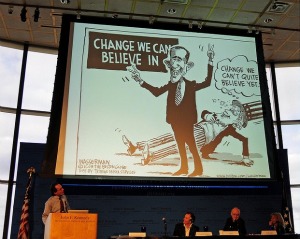
Peter King
The New York Times has a great story today on U.S. Rep. Peter King, R-N.Y., who is presiding over repugnant hearings into the loyalty of Muslim-Americans. Reporter Scott Shane reminds us that King made his reputation as a staunch supporter of the Irish Republican Army, which for years fought for independence from Britain in attacks that included the killing of hundreds of innocent civilians.
Yet I was struck by Shane’s lede, which frankly describes the IRA as “a terror group.” I don’t have any quarrel with that. But I was surprised, given the Times’ well-known squeamishness over using the T-word to describe Islamist organizations such as Hamas, which has engaged in suicide bombings against civilian targets in its war against Israel.
As the Times’ then-public editor, Clark Hoyt, wrote in 2008, “To the consternation of many, The Times does not call Hamas a terrorist organization, though it sponsors acts of terror against Israel.” It’s a policy that has put the Times in an awkward position previously, as in 2010, when the paper reported on criticism of Feisal Abdul Rauf, the imam of the proposed Islamic center near Ground Zero, for failing to label Hamas a terrorist group.
The United States, Canada, Israel, Japan and the European Union have all classified Hamas as a terrorist organization.
King’s response to being called out as a hypocrite is truly rancid, as he reveals that he couldn’t care less about the lives of British civilians who were killed in IRA attacks. “I understand why people who are misinformed might see a parallel,” he tells the Times. “The fact is, the IRA never attacked the United States. And my loyalty is to the United States.”
And in the 1980s, King had this to say: “If civilians are killed in an attack on a military installation, it is certainly regrettable, but I will not morally blame the IRA for it.”
Shane attempts to make comparisons between the IRA and Al Qaeda, and concludes — correctly — that Al Qaeda is considerably worse. But the parallels between the IRA and Hamas seem pretty obvious.
The IRA engaged in terrorist attacks, but gradually moved toward a renunciation of such attacks as it uneasily groped its way toward a peace settlement with Britain and participation in government.
Hamas, which governs the Gaza Strip, may or may not be capable of moving toward a peace settlement with Israel. But certainly it was unclear at a similar stage as to whether the IRA was capable of making such a transition.
It’s pretty simple. Either the IRA and Hamas are/were terrorist organizations, or neither is. I hope public editor Arthur Brisbane will explain why it’s all right for the Times to call the IRA a “terror group” when it refuses to do the same with respect to Hamas.







